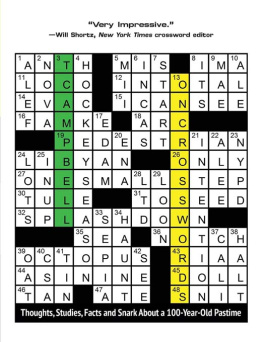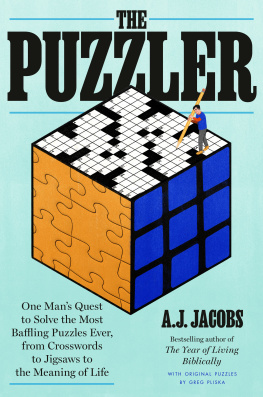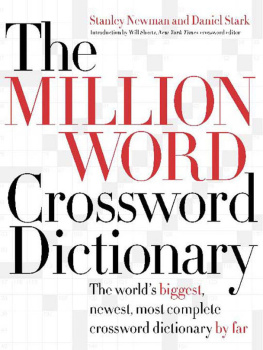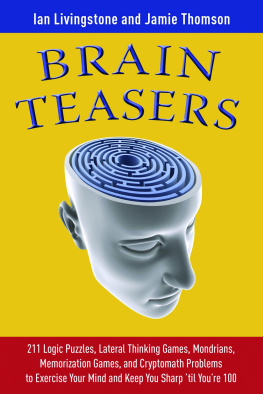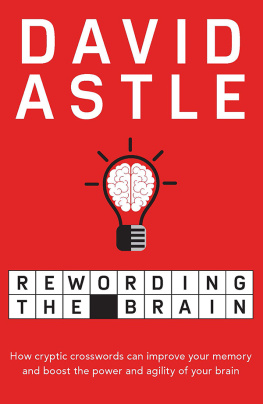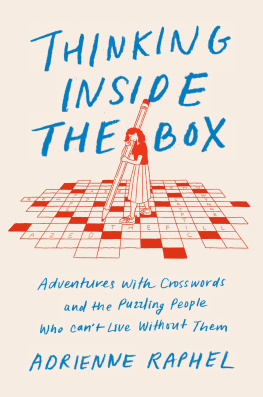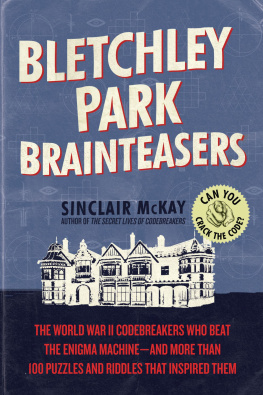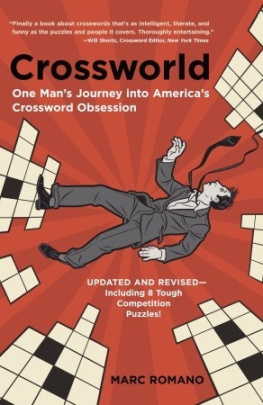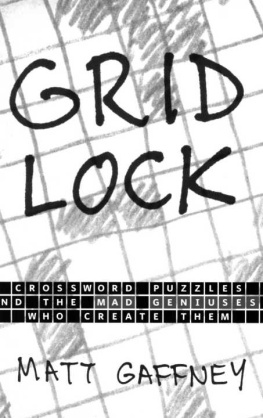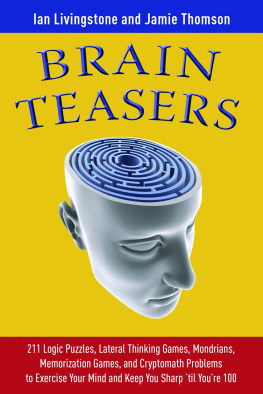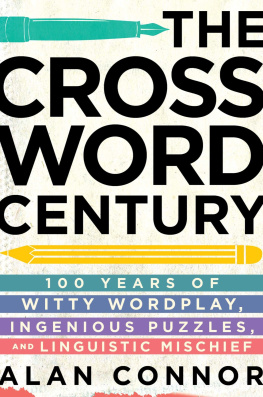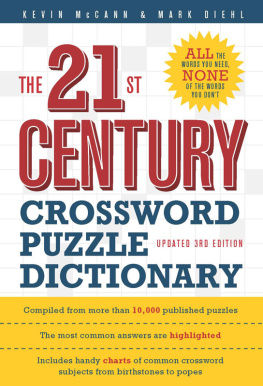On Crosswords
Thoughts, Studies, Facts and Snark
About a 100-Year-Old Pastime
T Campbell

NEW YORK
VIRGINIA
On Crosswords
by T Campbell
Copyright 2013 by T Campbell
ISBN 9781938467462
All rights reserved. No part of this publication may be reproduced, stored in a retrieval system, or transmitted in any form or by any means - electronic, mechanical, photocopy, recording, or any other - except for brief quotations in printed reviews, without the prior written permission of the author.
Published by

5 Penn Plaza, 23rd floor
c/o Morgan James Publishing
New York, NY 10001
212-574-7939
www.koehlerbooks.com
Publisher
John Kehler
Executive Editor
Joe Coccaro

| In an effort to support local communities, raise awareness and funds, Morgan James Publishing donates a percentage of all book sales for the life of each book to Habitat for Humanity Peninsula and Greater Williamsburg.
Get involved today, visit www.MorganJamesBuilds.com | 
|
CONTENTS
Foreword
As we approach the century mark of crosswords, weve seen a surge in crossword-related media, from the Wordplay movie chronicling a year at Will Shortzs annual American Crossword Puzzle Tournament to a number of books and memoirs about crosswords.
Whats the big deal about crosswords? From the crossword craze of the 1920s to the Sudoku craze of the 2000s, the world is obsessed with puzzles of all types. Sudoku is the most popular puzzle type in the world, by far, followed by word search. But it is crosswords that have a special place in our collective hearts. Pretty much every daily newspaper in the U.S. has puzzles, and I dont know of a major newspaper that doesnt have a crossword. Yes, even The Wall Street Journal has a crossword, though it only runs on Fridays, along with a variety puzzle on Saturdays.
Many have predicted that games like Angry Birds and Cut the Rope would kill puzzles like crosswords, but it hasnt happened. Tetris didnt kill crosswords either (nor did movies replace books, as Thomas Edison predicted). Nobody has made a Sudoku movie, and you dont see movie and comic strip characters solving word search puzzles very often, but weve all seen them solve crosswords. Nothing symbolizes intellectual prowess like solving a crossword in ink.
No other puzzle type combines both knowledge and logic in quite the same way. Whether youre aware of it or not, theres a logic puzzle in every crossword. To solve the puzzle, you combine the things that you know with your knowledge of how the English language works to deduce the things you dont (yet) know. A word starts with a Z? Its probably followed by a vowel (unless its ZLOTY). Take a clue like White House resident (4 letters). By itself, it is simply unknowable. There were many U.S. Presidents with 4-letter names. But, find out the last letter is a Z, and the answer PREZ may suddenly be obvious. Or find out the last letter is an A, and FDRs dog FALA may leap into your mind. And you feel smart for figuring it out.
The result of all this is that crosswords have had remarkable staying power. Theyve inspired scores of other puzzle types (many with fun names like rows garden and marching bands), as well as many games, from Scrabble to Upwords to my own game of WIM.
On Crosswords by T Campbell honors and explores the totality of crossword puzzlesin our culture and in our hearts and minds. Given Ts history, its not all too surprising he would write this particular book. Hes been pushing the limits with every project hes worked on. Fifty science fiction puzzles. The worlds largest crossword? Check.
This book is different. Unusual, too. It is not a how-to-solve book, nor is it a memoir. It is both scholarly and personal. Sometimes deeply personal. But, here, too, T has taken a somewhat different approach. Youre going to read a lot about what a lot of people think. If youre not one of the constructors or editors who produce the puzzles you solve, this is a wonderful opportunity to hear from and about those people. Which, as T knows, and youll soon know, relates to another reason why crosswords are what they areevery crossword is a personal reflection on its constructor (and they want you to solve it).
Of course, this book is a personal reflection on T. His analytical sensibility jumps out at me and I find the dissection here fascinating. As a longtime constructor and founder of the puzzle technology company Puzzazz, I think a lot about how puzzles workwhat makes them fun and enjoyable, and why people get addicted to them. But nobody has put together a Gestaltian analysis like this before. I learned quite a bit from the enjoyable read. You may agree or disagree with what T or somebody else says in this book (and sometimes, youll do both at the same time), but, if youre like me and love puzzles, you wont be able to ignore it.
Roy Leban
________________
Roy Leban is founder of the puzzle technology company Puzzazz. He has published thousands of puzzles of all types in newspapers, books, and magazines around the world, including The New York Times, the Los Angeles Times, GAMES magazine, and The Chronicle of Higher Education. In the software world, Roy is a serial entrepreneur who has produced groundbreaking work in desktop productivity, word processing, tablet computers, web publishing, educational software, and puzzles.
Crosswords: What Are They?
I am already judging you.
Because you downloaded or picked up this book, I am assuming you are crossword solvers, crosswordmakers, or people who simply love language. I will call you word nerds for short.
Well discuss how different flavors of crossword are made and solved. But as word nerds, you probably know that we always have to start by defining terms!
And while the word crossword probably feels familiar, defining it accurately can be a bit of a challenge. Certainly, crosswords themselves dont seem to be very good at it. See for yourse
(Spoiler alert! This book is going to give away some or all of the answers to many of the finest crosswords published since 1913. We cant help it! Theres no way to discuss the magic without revealing the secrets. So decide which matters to you more: your crossword virginity, or the never-ending quest for greater knowledge. Choose!)
lf.
Kevin McCanns and we get four:
Mentally stimulating pastime
Newspaper treats since 1913
Daily pastime for millions
Enigmatology topic
According to this wealth of information, we can determine that crosswords might be horoscopes. I dont know when horoscopes were first put in newspapers, but 1913 sounds like it could be right. Enigmatology could relate to the mysteries of the cosmos, and mental stimulation could refer to the exercise of figuring out how the horoscope applies to you.
Vague! But what should we have expected? Crosswords are puzzles, and puzzles are coy. Theyre not supposed to tell you everything. Lets give the dictionaries a shot at this instead.

